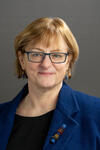Meg Urry
Hidden Supermassive Black Holes, AGN host galaxies, Unification of AGN, Supermassive Black Holes in AGN and the “Grand Unification” Hypothesis, Blazars, Kiloparsec-scale jets
Meg Urry is the Israel Munson Professor of Physics and Astronomy, and Director of the Yale Center for Astronomy and Astrophysics; she previously served as Chair of the Physics Department at Yale from 2007 to 2013 and in the Presidential line of the American Astronomical Society 2013-2017. Professor Urry received her Ph.D. from the Johns Hopkins University and her B.S. in Physics and Mathematics from Tufts University. Her scientific research focuses on active galaxies, which host accreting supermassive black holes in their centers. She has published over 330 refereed research articles on supermassive black holes and galaxies, including one of the most highly cited review papers in astronomy. Prof. Urry is a Fellow of the American Academy of Arts and Sciences, the National Academy of Sciences, the American Association for the Advancement of Science, the American Astronomical Society, the American Physical Society, and American Women in Science; received an honorary doctorate from Tufts University; was awarded the American Astronomical Society’s Annie Jump Cannon and George van Biesbroeck prizes, and Yale University’s Howard R. Lamar award. Prior to moving to Yale in 2001, Prof. Urry was a senior astronomer at the Space Telescope Science Institute, which runs the Hubble Space Telescope for NASA. Professor Urry is also known for her efforts to increase the number of women and minorities in science, for which she won the 2015 Edward A. Bouchet Leadership Award from Yale University and the 2010 Women in Space Science Award from the Adler Planetarium. In 2002 she created the “flipped” classroom version of introductory Physics at Yale, and she is the founding Physics instructor for the Global Teaching Project, which provides advanced courses to promising high school students in under-served areas, beginning with a pilot program in rural Mississippi. She also writes about science for CNN.com.
Prof. Urry’s scientific research focuses on active galaxies, which host accreting supermassive black holes in their centers. Her group uses telescopes in space and on the ground, to conduct multi-wavelength surveys, measure line widths from which black hole masses can be derived, and analyze the dominant radiation components. To interpret these data, Urry and her collaborators develop models for the evolution of black hole growth over cosmic time. In recent years, the group has developed machine learning techniques to study galaxy properties and to characterize spectral energy distributions. Some of this work is done with collaborators around the world.
Ph.D. Johns Hopkins University (1984), B.S. Physics & Math (1977)
Prof. Urry is a Fellow of the American Academy of Arts and Sciences, the National Academy of Sciences, the Connecticut Academy of Science and Engineering, the Johns Hopkins University Society of Scholars, the American Association for the Advancement of Science, the American Astronomical Society, the American Physical Society, and American Women in Science. She received an honorary doctorate from Tufts University, and was awarded the American Astronomical Society’s Annie Jump Cannon and George van Biesbroeck prizes, and Yale University’s Howard R. Lamar award. She has given prize lectures at Rice University, the University of Maryland at Baltimore County, the University of Western Ontario, Oregon State University, Cambridge University, Oxford University, Tufts University, the Space Telescope Science Institute, the University of Texas at Austin, Mills College, and Wesleyan University. She is particularly proud of having received the Edward A. Bouchet Leadership Medal, for her efforts to broaden participation in STEM fields.
